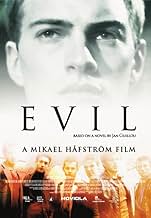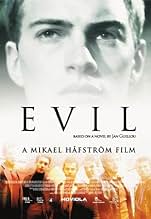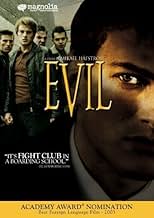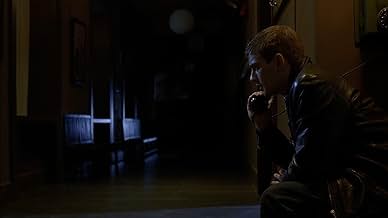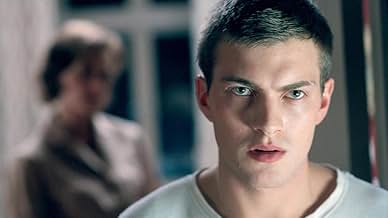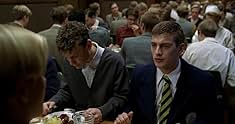IMDb-BEWERTUNG
7,7/10
43.633
IHRE BEWERTUNG
Ein Teenager, der wegen Schlägereien von der Schule verwiesen wurde, kommt in ein Internat, in dem das systematische Mobbing jüngerer Schüler als Mittel zur Aufrechterhaltung der Disziplin g... Alles lesenEin Teenager, der wegen Schlägereien von der Schule verwiesen wurde, kommt in ein Internat, in dem das systematische Mobbing jüngerer Schüler als Mittel zur Aufrechterhaltung der Disziplin gefördert wird.Ein Teenager, der wegen Schlägereien von der Schule verwiesen wurde, kommt in ein Internat, in dem das systematische Mobbing jüngerer Schüler als Mittel zur Aufrechterhaltung der Disziplin gefördert wird.
- Für 1 Oscar nominiert
- 9 Gewinne & 10 Nominierungen insgesamt
Empfohlene Bewertungen
Erik Ponti(Andreas Wilson) is a young trouble maker who is constantly abused by his stepfather and often ignored by his mother. After a fight in his school, Eric gets enrolled in a boarding school by his mother. At the new school, Erik only makes one good friend Pierre(Henrik Lundström) but their lives slowly start falling apart when the older boys from the school make a pact to make Erik's life a living hell. This was a very gripping and disturbing movie. I saw this at the Vancouver Film Festival and enjoyed it quite a lot. Andreas Wilson is a gorgeous and talented young man and I hope he becomes big someday. I would give Ondskan or also known as "Evil" 8/10.
Swedish "Ondskan" competed against a strong field in the Foreign Language Film category in last year's Oscar which was won deservedly by Canada's "Les Invasions Barbares". While my personal favorite is "Tasogare Seibei", Ondskan is a worthwhile contender.
The scene is familiar, boarding school bullying, upper class domination and violence. The message however is broader and more general. Ghandi has been mentioned a couple of times in the movie, which reminds me as well of the "enduring" heroes in the westerns in the fifties who adhere steadfastly to their principle, refusing to be provoked into violence (the best example is The Big Country). The motivation of the "hero" in Ondskan is however a little less lofty, as I'm going to explain.
Thanks to his dominating and sadistic step-father, Erik (Andreas Wilson) is well-equipped to endure violence and abuse when he is sent to a prestigious boarding school after causing a lot of problems at his local high school. While a veteran perpetrator of violence himself, Erik is effectively constrained as if by a spell cast by the boarding school: anyone fighting with a member of the student council will be expelled.
Most of the movie surrounds the senior students' tyrannizing over the juniors, and it gets a bit too long. There's no point in elaborating other than saying that the violence is not particularly graphic (accepting that some may disagree) and if you're going to throw up in the cinema, it's most likely due to some other revolting scenes, the details of which I'll spare. Although Erik's motivation in enduring the abuses and violence is essentially self-preservation (from expulsion), he does earn the audience admiration, which makes the poetic justice at the end rather sweet.
A great part of the movie's success owes to Wilson's excellent performance. Although most of the audience start with thinking that Erik is the "evil" character, they would soon turn completely around and empathize with him, and eventually love him. Also excellent is Henrik Lundstrom, playing Erik's meek, plump roommate who is victimizes as he becomes the villains' tool to break tough Erik. In addition to this affecting friendship, there are two other sub-plots which enrich the movie without detracting from the main theme. One is Erik's romance with a maid at the school. The other is his success with the school's swimming team.
Finally, one interesting point is that Erik's way out, his "court of final appeal", turns out to be indeed the legal route. While this makes it a little bit of a fairy tale ending, there is something to ponder over. There may really be numerous pockets of quasi jurisdictions such as the boarding school that really need to be straighten out by the real legal system. That point I'll leave to the legal experts.
The scene is familiar, boarding school bullying, upper class domination and violence. The message however is broader and more general. Ghandi has been mentioned a couple of times in the movie, which reminds me as well of the "enduring" heroes in the westerns in the fifties who adhere steadfastly to their principle, refusing to be provoked into violence (the best example is The Big Country). The motivation of the "hero" in Ondskan is however a little less lofty, as I'm going to explain.
Thanks to his dominating and sadistic step-father, Erik (Andreas Wilson) is well-equipped to endure violence and abuse when he is sent to a prestigious boarding school after causing a lot of problems at his local high school. While a veteran perpetrator of violence himself, Erik is effectively constrained as if by a spell cast by the boarding school: anyone fighting with a member of the student council will be expelled.
Most of the movie surrounds the senior students' tyrannizing over the juniors, and it gets a bit too long. There's no point in elaborating other than saying that the violence is not particularly graphic (accepting that some may disagree) and if you're going to throw up in the cinema, it's most likely due to some other revolting scenes, the details of which I'll spare. Although Erik's motivation in enduring the abuses and violence is essentially self-preservation (from expulsion), he does earn the audience admiration, which makes the poetic justice at the end rather sweet.
A great part of the movie's success owes to Wilson's excellent performance. Although most of the audience start with thinking that Erik is the "evil" character, they would soon turn completely around and empathize with him, and eventually love him. Also excellent is Henrik Lundstrom, playing Erik's meek, plump roommate who is victimizes as he becomes the villains' tool to break tough Erik. In addition to this affecting friendship, there are two other sub-plots which enrich the movie without detracting from the main theme. One is Erik's romance with a maid at the school. The other is his success with the school's swimming team.
Finally, one interesting point is that Erik's way out, his "court of final appeal", turns out to be indeed the legal route. While this makes it a little bit of a fairy tale ending, there is something to ponder over. There may really be numerous pockets of quasi jurisdictions such as the boarding school that really need to be straighten out by the real legal system. That point I'll leave to the legal experts.
I would recommend Ondskan to anyone who is interested in coming-of-age films. American cinema has always been expert at such portrayals, and it is good to see so accomplished an example out of Sweden. I liked especially the fact that the director never wavers as he unmasks the unwholesome face of an angst-ridden, violence-prone, socially intransigent Swedish society of the not so long ago . Set in the fifties, mostly at a posh boarding school for the upper-class, where the sixth-form boys, led by an effete Swedish aristocrat, go about enforcing their arbitrary and violent rules while the faculty turn a blind eye, this film cleverly avoids the hooks, punches and triumphs of the underdog come to grips with the jack-booted status quo via his fists alone by allowing him to prevail to justice through the implementation of Swedish law. There are enough fisticuffs along the way, however, to satisfy the blood-thirsty among you. Well-acted, good script, beautiful cinematographic moments.
I wonder, as I write this, why a film like Ondskan hasn't received commercial distribution in the States. Perhaps distributors assume Americans are too removed from the world of mid-century upper class boy's boarding schools in Sweden to relate to the film, which is our loss. Ondskan presents a microcosm of cruelty, status, and one-upsmanship - one might say evil - that exists in such an institution. Every year we read another horror story of a hazing gone too far. Children trounce their playmates. There's plenty of physical aggression among boys. The latest discussion concerns what among girls is called relational aggression, in which an individual is harmed through the hurtful manipulation of peer relationships and/or their friendships. .Neal LaBute has taken the idea of sadistic relationships to the American workplace in 'In the Company of Men' and to the suburbs in 'Your Friends and Neighbors'. There have certainly been other films tackling this particularly subject of sadism in boarding schools, Young Torless (Der Junge Törless) in 1966, comes especially to mind. What is captivating about Ondskan ('Evil') is both cinematic and psychological. The world of this o-so reputable boys school is painted in earth tones and fine wood with muted light rendering its cold emotions. The set design by Anna Asp (who's has done some other great looking films) lets us feel as though we have lived in this space. The lead character, Erik Ponti, at first we think will be the embodiment of the 'evil' of the title. He is regularly and systematically strapped by his stepfather. He transfers that frustration to his own classmates, which is what gets him sent to the boarding school in question. There he is ritually brutalized by the upperclassmen, which is, we are led to understand, the expected behavior in this hierarchy. To the administration and faculty this is apparently part of school tradition. Eric's initial unwillingness to fight back, despite a similar unwillingness to bend to arbitrary, sadistic, and unwritten rules, is relentlessly frustrating. As an audience we really want him to act. But his honor, his fortitude, and the fact his mother has hocked some heirlooms to pay tuition, keep him from lashing back. We are thus submitted to the same unremitting abuses with no real payoff. I will refrain from revealing the end, but it is not when or what you might expect. The result is a great ride and an elating experience. The audiences at Harvard, where I saw the film, applauded afterward. It's not a perfect film. There are clichés and expected set-ups. Still the mushy adolescence of the actors cast in these parts is consistently smart. The music is tasteful and well used. The direction is subtle and the violence is felt more than seen, but when it happens it is as ugly as it deserves to be.
10somf
I was amazed at how excellent this film was. I just did not expect much and I was blown away. My first Mikael Hafstrom film was Derailed which also surprised me. It was not a great film but it was very good and much better than the general reviews that it garnered. It made me curious about Evil and I just cannot recommend this film enough. Andreas Wilson is terrific as the "title" character and the way his character develops is quite different from the way one might expect. You will be rooting for him to overcome the cruelty and evil that surrounds him throughout the film. If you enjoy coming of age tales do not miss this masterpiece. I look forward to Mr. Hafstroms future films. "1408" is up next and it sounds terrific.
One more thing, I just finished watching Saint Ralph and would highly recommend watching it as a double feature with "Evil". They really play well together.
One more thing, I just finished watching Saint Ralph and would highly recommend watching it as a double feature with "Evil". They really play well together.
Wusstest du schon
- WissenswertesThe movie is based on a novel by Jan Guillou. Guillou attended a boarding school himself when he was a teenager and the novel is partly based on his own experiences.
- PatzerIt is sometime after Christmas when Erik is trying to see the Finnish girl for the last time but there are yellow and falling leaves visible behind him.
- Zitate
Headmaster: There is only one word for people like you, and that is "evil"
- VerbindungenFeatured in The 76th Annual Academy Awards (2004)
- SoundtracksStupid Cupid
Written by Howard Greenfield (as Greenfield) and Neil Sedaka (as Sedaka)
Performed by Connie Francis
With the kind permission of Warner/Chappell Music Scand.AB and Universal Music AB
Top-Auswahl
Melde dich zum Bewerten an und greife auf die Watchlist für personalisierte Empfehlungen zu.
- How long is Evil?Powered by Alexa
Details
- Erscheinungsdatum
- Herkunftsländer
- Offizieller Standort
- Sprachen
- Auch bekannt als
- Faustrecht
- Drehorte
- Produktionsfirmen
- Weitere beteiligte Unternehmen bei IMDbPro anzeigen
Box Office
- Budget
- 22.000.000 SEK (geschätzt)
- Bruttoertrag in den USA und Kanada
- 15.530 $
- Eröffnungswochenende in den USA und in Kanada
- 2.448 $
- 12. März 2006
- Weltweiter Bruttoertrag
- 528.245 $
- Laufzeit1 Stunde 53 Minuten
- Farbe
- Sound-Mix
- Seitenverhältnis
- 1.85 : 1
Zu dieser Seite beitragen
Bearbeitung vorschlagen oder fehlenden Inhalt hinzufügen








